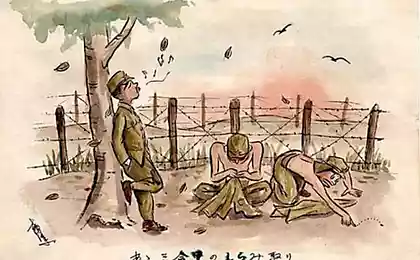776
Terms of Japanese life: a completely different world through the eyes of our fellow
Says the Russian historian who has lived in Japan godIstorik Vasily Shchepkin, who has lived in Japan a year - about the rules of life in Japanese.
Feast for the Japanese - is not only a way to relax after a day's work. It is also an occasion to continue the business conversations in an informal setting. In addition, joint gatherings bring together, allow to know each other in a new way, to improve the atmosphere in the team. And remember the next day that it was the day before, it is not accepted.

In Japan, I visited more than once, each of them - in a new age and quality. Therefore, it surprised each time something new. In 12 years, I hit that one on the planet we have a completely different world, where high-speed trains and skyscrapers coexist with rice fields and mountains impassable thickets. In which sea beaches are empty, despite the summer heat, and in schools and museums are greeted at the entrance to the shelves of the same size slippers. And even when the study of Japan has become my profession, place of surprise remained. Especially when had a chance to spend a year in Japan, and "to live in Japanese».
Upon arrival, the foreigner has to register with the local administration. In Japan, there is no internal passports, all the "civil status" recorded in the "house-books" stored in the municipalities. Therefore, when applying for government services do not need to bring anything - all information the staff is at hand. For a couple of hours in the administration of our family houses and issued the book, and medical insurance, and benefits for children, and our three year old daughter even passed a medical examination.
In Japan, expensive utilities - winter their total value reached a monthly rent. Central heating is only on the northern island of Hokkaido, it is gas, and gas is expensive. To save money, the Japanese do not just turn off the radiators in the night, but also halt the doors blankets. In the rest of the country are electric heaters in the winter, which is also expensive. In winter, with the small hotels you can take an extra fee - for heat.
The most striking manifestation of the Japanese etiquette. Workers skid our home refrigerator, contrived, not letting it go quickly undressed in the hallway. Once at the checkout in the supermarket purchase amount was not round (something like 4280 yen). I would like to receive the surrender of one denomination and give 5280 yen, but was mistaken in coins and handed 5240 yen. The cashier is instead to point out my mistake (which we have in Russia often takes the form of the question "What are you giving me?"), Without any emotion on his face fines counted 960 yen (the smallest bill - 1,000 yen). Such manifestations of politeness is not only surprising, but also quickly get into the habit. Returns to the routine of the Russian "service" harder.

Japanese politeness - it is the outward manifestation of the fundamental basis of society and human relations: the primacy of the collective over the individual and vertical (senior-junior) and horizontal (friend or foe) hierarchy. Their roots - in Confucian ideas about the state, society and human relations. In XIII-XIX centuries, Confucian texts became the basis of the formation of the ruling samurai class. But in the second half of the XIX century, when the country embarked on the path towards European development Confucian notions of duty, loyalty, filial piety became the basis of Japanese ethics. The nature of the Japanese people affected and geography: insularity and frequent earthquakes, typhoons and tsunamis. It is to them the Japanese owe their humility and fortitude.
The primacy of collective relations leads to what is familiar to us bosom friendship - a rare phenomenon. Adults are virtually nonexistent outside of work, and because the staff are friendly and mostly within the team, and school and university students - companies. And make friends with the Japanese, it is necessary to become a member of the team. Possibilities enough: the Japanese love to talk, sing karaoke together, including Russian songs.
Rest the Japanese know how to love, you can find a partner for every taste. Here you and your favorite Japanese hot springs and sports centers. A separate theme - the purchase: the Japanese can spend the day wandering through the shopping areas or the seasonal fairs, open city parks.
Japanese food has little to do with what is presented as such abroad. Japanese love sushi, but this dish belongs to the category of relatively expensive delicacies, but because the average Japanese regales them every few weeks. Basis of Japanese cuisine - rice and noodles. Japanese do not eat insects, but many unusual dishes I tried sea cucumber, snail, whale meat sushi, sashimi of horse.
The Japanese also love to drink. No significant event in the life of the team, whether it is the appearance of a new employee or the completion of an important event, is held without cheer. As a rule, first to reserve a table in the establishment where you can enjoy hot and cold snacks. Usually begins with a beer, then orders each what it wants - the rice wine (sake), shochu (a drink stronger) or whiskey-based cocktails. After the first feast visitors can go on a "second meeting" - a bar or karaoke, and the last point of the evening can become an institution that serves ramen - egg noodles in broth. It is believed that this dish absorbs fusel oils and makes it easier to hang.
External manifestation of politeness rather quickly taken over: begin to bow when necessary, uses a special polite language. And in the Japanese language and communication situations quite a lot of punches - on a certain phrase or action there is always an answer provided by the rules. At the same time we must always remember that no matter how much aspire to be like the Japanese, you always remain for them "gaijin" - as they called for the eyes of the visiting Europeans. This word means not only "foreigner", a man from the outside, from another world. So any errors in the language and behavior of his forgivable, though, and may cause dissatisfaction of local residents who are not accustomed to communicate with foreigners. Sometimes the "special relationship" may be uncomfortable for the aliens themselves. It happens that, in spite of the question or appeal to the competent spoken Japanese, a Japanese spokesman stubbornly refuses to move to their native language and, blushing and shy, tries to answer in broken English.
Key to successful stay in Japan for foreigners to behave in Japanese with friends and colleagues, and remember that you - a foreigner, when you communicate with strangers.
via www.geo.ru/mneniya/chelovek-iz-drugogo-mira?page=1#article-body
Feast for the Japanese - is not only a way to relax after a day's work. It is also an occasion to continue the business conversations in an informal setting. In addition, joint gatherings bring together, allow to know each other in a new way, to improve the atmosphere in the team. And remember the next day that it was the day before, it is not accepted.

In Japan, I visited more than once, each of them - in a new age and quality. Therefore, it surprised each time something new. In 12 years, I hit that one on the planet we have a completely different world, where high-speed trains and skyscrapers coexist with rice fields and mountains impassable thickets. In which sea beaches are empty, despite the summer heat, and in schools and museums are greeted at the entrance to the shelves of the same size slippers. And even when the study of Japan has become my profession, place of surprise remained. Especially when had a chance to spend a year in Japan, and "to live in Japanese».
Upon arrival, the foreigner has to register with the local administration. In Japan, there is no internal passports, all the "civil status" recorded in the "house-books" stored in the municipalities. Therefore, when applying for government services do not need to bring anything - all information the staff is at hand. For a couple of hours in the administration of our family houses and issued the book, and medical insurance, and benefits for children, and our three year old daughter even passed a medical examination.
In Japan, expensive utilities - winter their total value reached a monthly rent. Central heating is only on the northern island of Hokkaido, it is gas, and gas is expensive. To save money, the Japanese do not just turn off the radiators in the night, but also halt the doors blankets. In the rest of the country are electric heaters in the winter, which is also expensive. In winter, with the small hotels you can take an extra fee - for heat.
The most striking manifestation of the Japanese etiquette. Workers skid our home refrigerator, contrived, not letting it go quickly undressed in the hallway. Once at the checkout in the supermarket purchase amount was not round (something like 4280 yen). I would like to receive the surrender of one denomination and give 5280 yen, but was mistaken in coins and handed 5240 yen. The cashier is instead to point out my mistake (which we have in Russia often takes the form of the question "What are you giving me?"), Without any emotion on his face fines counted 960 yen (the smallest bill - 1,000 yen). Such manifestations of politeness is not only surprising, but also quickly get into the habit. Returns to the routine of the Russian "service" harder.

Japanese politeness - it is the outward manifestation of the fundamental basis of society and human relations: the primacy of the collective over the individual and vertical (senior-junior) and horizontal (friend or foe) hierarchy. Their roots - in Confucian ideas about the state, society and human relations. In XIII-XIX centuries, Confucian texts became the basis of the formation of the ruling samurai class. But in the second half of the XIX century, when the country embarked on the path towards European development Confucian notions of duty, loyalty, filial piety became the basis of Japanese ethics. The nature of the Japanese people affected and geography: insularity and frequent earthquakes, typhoons and tsunamis. It is to them the Japanese owe their humility and fortitude.
The primacy of collective relations leads to what is familiar to us bosom friendship - a rare phenomenon. Adults are virtually nonexistent outside of work, and because the staff are friendly and mostly within the team, and school and university students - companies. And make friends with the Japanese, it is necessary to become a member of the team. Possibilities enough: the Japanese love to talk, sing karaoke together, including Russian songs.
Rest the Japanese know how to love, you can find a partner for every taste. Here you and your favorite Japanese hot springs and sports centers. A separate theme - the purchase: the Japanese can spend the day wandering through the shopping areas or the seasonal fairs, open city parks.
Japanese food has little to do with what is presented as such abroad. Japanese love sushi, but this dish belongs to the category of relatively expensive delicacies, but because the average Japanese regales them every few weeks. Basis of Japanese cuisine - rice and noodles. Japanese do not eat insects, but many unusual dishes I tried sea cucumber, snail, whale meat sushi, sashimi of horse.
The Japanese also love to drink. No significant event in the life of the team, whether it is the appearance of a new employee or the completion of an important event, is held without cheer. As a rule, first to reserve a table in the establishment where you can enjoy hot and cold snacks. Usually begins with a beer, then orders each what it wants - the rice wine (sake), shochu (a drink stronger) or whiskey-based cocktails. After the first feast visitors can go on a "second meeting" - a bar or karaoke, and the last point of the evening can become an institution that serves ramen - egg noodles in broth. It is believed that this dish absorbs fusel oils and makes it easier to hang.
External manifestation of politeness rather quickly taken over: begin to bow when necessary, uses a special polite language. And in the Japanese language and communication situations quite a lot of punches - on a certain phrase or action there is always an answer provided by the rules. At the same time we must always remember that no matter how much aspire to be like the Japanese, you always remain for them "gaijin" - as they called for the eyes of the visiting Europeans. This word means not only "foreigner", a man from the outside, from another world. So any errors in the language and behavior of his forgivable, though, and may cause dissatisfaction of local residents who are not accustomed to communicate with foreigners. Sometimes the "special relationship" may be uncomfortable for the aliens themselves. It happens that, in spite of the question or appeal to the competent spoken Japanese, a Japanese spokesman stubbornly refuses to move to their native language and, blushing and shy, tries to answer in broken English.
Key to successful stay in Japan for foreigners to behave in Japanese with friends and colleagues, and remember that you - a foreigner, when you communicate with strangers.
via www.geo.ru/mneniya/chelovek-iz-drugogo-mira?page=1#article-body
9 proven ways to kill themselves using self
"The inspiration was gone" 15 ways to get out of his stupor























